
The Presbyterian Church (USA), abbreviated PC (USA), is a mainline Protestant denomination in the United States. It is the largest Presbyterian denomination in the country, known for its liberal stance on doctrine and its ordaining of women and members of the LGBT community as elders and ministers. The Presbyterian Church (USA) was established with the 1983 merger of the Presbyterian Church in the United States, whose churches were located in the Southern and border states, with the United Presbyterian Church in the United States of America, whose congregations could be found in every state.

The Rhineland is a loosely defined area of Western Germany along the Rhine, chiefly its middle section.
Presbyterianpolity is a method of church governance typified by the rule of assemblies of presbyters, or elders. Each local church is governed by a body of elected elders usually called the session or consistory, though other terms, such as church board, may apply. Groups of local churches are governed by a higher assembly of elders known as the presbytery or classis; presbyteries can be grouped into a synod, and presbyteries and synods nationwide often join together in a general assembly. Responsibility for conduct of church services is reserved to an ordained minister or pastor known as a teaching elder, or a minister of the word and sacrament.

Kleve is a town in the Lower Rhine region of northwestern Germany near the Dutch border and the River Rhine. From the 11th century onwards, Cleves was capital of a county and later a duchy. Today, Cleves is the capital of the district of Kleve in the German state of North Rhine-Westphalia. The city is home to one of the campuses of the Rhine-Waal University of Applied Sciences.

The Uniting Church in Australia (UCA) was founded on 22 June 1977, when most congregations of the Methodist Church of Australasia, about two-thirds of the Presbyterian Church of Australia and almost all the churches of the Congregational Union of Australia united under the Basis of Union. According to the church, it had 243,000 members in 2018. In the 2016 census, about 870,200 Australians identified with the church; in the 2011 census, the figure was 1,065,796. The UCA is Australia's third-largest Christian denomination, behind the Catholic and the Anglican Churches. There are around 2,000 UCA congregations, and 2001 National Church Life Survey (NCLS) research indicated that average weekly attendance was about 10 per cent of census figures.

The Heidelberg Catechism (1563), one of the Three Forms of Unity, is a Protestant confessional document taking the form of a series of questions and answers, for use in teaching Calvinist Christian doctrine. It was published in 1563 in Heidelberg, Germany. Its original title translates to Catechism, or Christian Instruction, according to the Usages of the Churches and Schools of the Electoral Palatinate. Commissioned by the prince-elector of the Electoral Palatinate, it is sometimes referred to as the "Palatinate Catechism." It has been translated into many languages and is regarded as one of the most influential of the Reformed catechisms.
The Dutch Reformed Church was the largest Christian denomination in the Netherlands from the onset of the Protestant Reformation in the 16th century until 1930. It was the original denomination of the Dutch Royal Family and the foremost Protestant denomination until 2004. It was the larger of the two major Reformed denominations, after the Reformed Churches in the Netherlands was founded in 1892. It spread to the United States, South Africa, Indonesia, Sri Lanka, Brazil, and various other world regions through Dutch colonization. Allegiance to the Dutch Reformed Church was a common feature among Dutch immigrant communities around the world and became a crucial part of Afrikaner nationalism in South Africa.
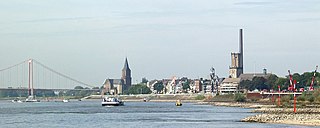
Emmerich am Rhein is a city and municipality in the northwest of the German federal state of North Rhine-Westphalia. The city has a harbour and a quay at the Rhine. In terms of local government organization, it is a medium-sized city belonging to the district of Kleve in the administrative region (Regierungsbezirk) of Düsseldorf.

The Duchy of Cleves was a State of the Holy Roman Empire which emerged from the medieval Hettergau. It was situated in the northern Rhineland on both sides of the Lower Rhine, around its capital Cleves and the towns of Wesel, Kalkar, Xanten, Emmerich, Rees and Duisburg bordering the lands of the Prince-Bishopric of Münster in the east and the Duchy of Brabant in the west. Its history is closely related to that of its southern neighbours: the Duchies of Jülich and Berg, as well as Guelders and the Westphalian county of Mark. The Duchy was archaically known as Cleveland in English.

The Prussian Union of Churches was a major Protestant church body which emerged in 1817 from a series of decrees by Frederick William III of Prussia that united both Lutheran and Reformed denominations in Prussia. Although not the first of its kind, the Prussian Union was the first to occur in a major German state.

The Battle of Oosterweel took place on 13 March 1567 near the village of Oosterweel, near Antwerp, in present-day Belgium, and is traditionally seen as the beginning of the Eighty Years' War. A Spanish mercenary army surprised a band of rebels and killed or captured almost all of them.

Protestant Church in the Rhineland is a United Protestant church body in parts of the German states of North Rhine-Westphalia, Rhineland-Palatinate, Saarland and Hesse (Wetzlar). This is actually the area covered by the former Prussian Rhine Province until 1920.
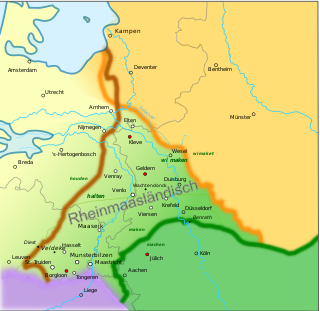
Meuse-Rhenish is the modern term for literature written in the Middle Ages in the greater Meuse-Rhine area, in a literary language that is effectively Middle Dutch. This area stretches in the northern triangle roughly between the rivers Meuse and Rhine. It also applies to the Low Franconian dialects that have been spoken in that area continuously from medieval times up to now in modern times in a non-literary context. It includes varieties of South Guelderish (Zuid-Gelders) and Limburgish in the Belgian and Dutch provinces of Limburg, and their German counterparts Low Rhenish including Bergish in German Northern Rhineland. Although some dialects of this group are spoken within the language area where German is the standard, they actually are Low Franconian in character, and are more closely related to Dutch than to High German, and could therefore also be called Dutch. With regard to this German part only, Meuse-Rhenish equals the total of Low Rhenish vernaculars.
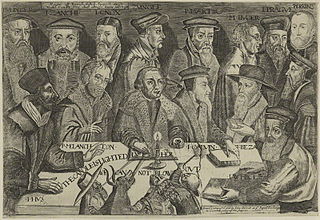
Calvinism originated with the Reformation in Switzerland when Huldrych Zwingli began preaching what would become the first form of the Reformed doctrine in Zürich in 1519.
The Indonesian Christian Church is an Indonesian church of Presbyterian denomination. It adheres to Calvinist theology.
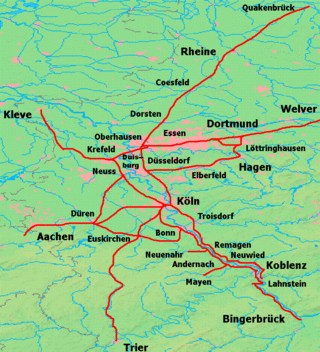
The Rhenish Railway Company was along with the Cologne-Minden Railway Company (CME) and the Bergisch-Märkische Railway Company (BME) one of the railway companies that in the mid-19th century built the first railways in the Ruhr and large parts of today's North Rhine-Westphalia.
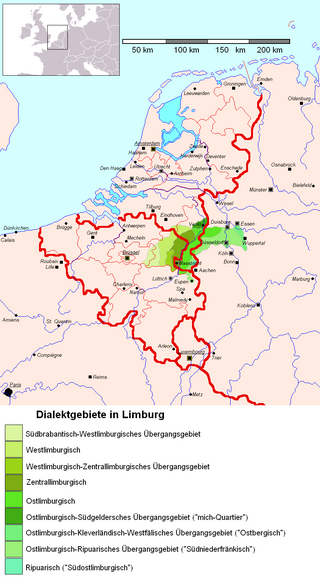
Bergish is a collective name for a group of West Germanic dialects spoken in the Bergisches Land region east of the Rhine in western Germany. The name is commonly used among its speakers, but is not of much linguistic relevance, because the varieties belong to several quite distinct groups inside the continental West Germanic dialect continuum. As usual inside a dialect continuum, neighbouring varieties have a high degree mutual intelligibility and share many similarities while the two more distant ones may be completely mutually unintelligible and considerably different. Therefore, speakers usually perceive the differences in their immediate neighbourhood as merely dialectal oddities of an otherwise larger, solid group or language that they are all part of, such as "Bergish". Bergish is itself commonly classified as a form of "Rhinelandic", which in turn is part of German. Bergish in a strict sense is the eastmost part of the Limburgish language group, which extends far beyond the rivers Rhine and Maas into the Netherlands and Belgium. Bergish in a strict sense is located in the North West. It combines Low Franconian properties with some Ripuarian properties and is seen as a transitory dialect between them in the dialect continuum of Dutch and German. The Bergish varieties in the northern areas are also referred to as parts of Meuse-Rhenish, which exclusively refers to the Low Franconian varieties, that are Limburgish including Bergish.
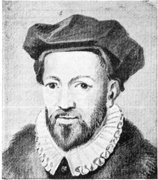
Pieter Datheen, Latin Petrus Dathenus, English, Peter Datheen, was a Dutch Calvinist theologian, the 16th century reformer of The Netherlands, who accomplished many things for the advancement the Reformed Church liturgy and ecclesiastical polity.

The siege of Aachen took place in late August 1614, when the Spanish Army of Flanders, led by Ambrogio Spinola, 1st Marquis of the Balbases, marched from Maastricht to Germany to support Wolfgang Wilhelm, Count Palatine of Neuburg, during the War of the Jülich Succession. Despite its status as a free imperial city, Aachen was under the protection of John Sigismund of Brandenburg, Neunburg's ally, and then rival, in the battle for the United Duchies of Jülich-Cleves-Berg. In 1611, the Protestant population of Aachen had revolted against the Catholic city council and had seized power. When the Holy Roman Emperor Rudolf II, observing the Peace of Augsburg, had ordered the previous state to be restored, the Protestants had allied themselves with the Margraviate of Brandenburg. The unexpected arrival of a Spanish army at the gates of the city, however, caused the Protestants to lose courage and surrender Aachen to Spinola. A Catholic garrison was installed and a process of re-Catholicization began.

The Protestant Reformed Church of Alsace and Lorraine is a Calvinist denomination in Alsace and northeastern Lorraine, France. As a church body, it enjoys the status as an établissement public du culte.















